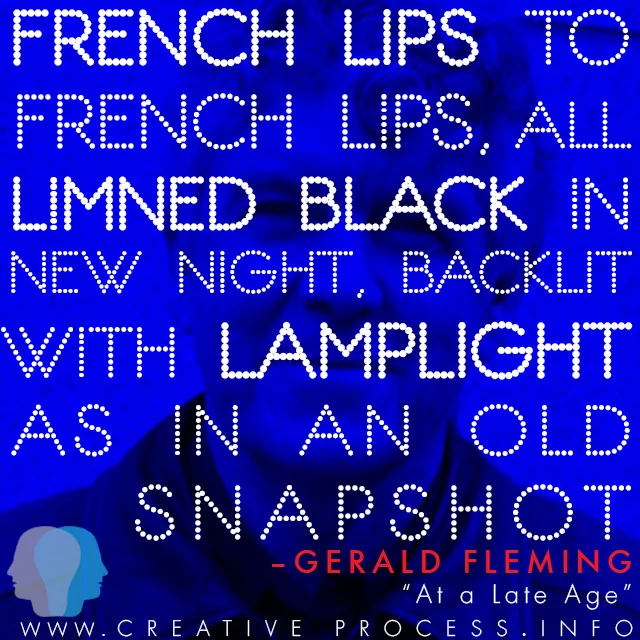The Choreographer
/At last, he understood that all his life had been choreography for his funeral. He came to this not through therapy, but during a walk in the woods on his friend Bernstein’s sheep farm in southern Oregon.
It was January, he’d been invited to spend the week, and early Monday before the others were up he went walking in the cold, the maples still holding brilliant leaves on their lowest branches, his boots crunching ice along the path. He stopped at the pond, broke off a pane of ice from its surface, held it up, saw his own crazed reflection there, an abstraction he was proud to appreciate, and he wanted to tell Bernstein about it, Bernstein a painter, tell him about the fascinating distortion, the outline of the nose limning a raised ridge in the ice, the chin line carved along the edge—he wanted his friend to know that he understood abstraction. And when he came back into the house, went into his paneled room overlooking the sheep pen, took off his jacket and gloves and rehearsed his quick speech about the glassy ice, he knew then, in the quiet of the house, that the entire speech was meant to plant in Bernstein’s head the possibility, the suggestion, of his painter friend rising at his funeral and saying, “I just want to say that he understood abstraction.”
He sat on the bed, and in a moment less of honesty than of a long life’s filtration, saw that almost everything he had said or done in his life after, say, age thirty, had been funeral choreography.
For decades now, he admitted, he’d pictured the exact room of his memorial: warm yellow light, metal chairs, a bank of windows revealing a mature garden, wine and hors d’oeuvres on a table at the rear, a crowd larger than the capacity of the place. A winter afternoon—perhaps not unlike what today’s afternoon will be, he thought.
How familiar he was with that place. It had been his, detail after detail added, for thirty years now—was always there when he spoke, didn’t speak, acted, didn’t act.
When he was a lover, he was a lover in order that the beautiful woman he was caressing might, at that memorial, stand—only at the end, mind you—and in a soft voice say I just wanted to mention that he was a wonderful lover, and then ten women, emboldened, would stand and in a quickly accelerating crescendo say He certainly was, and it would be a moment of great humor, memorable.
When he took time to speak with the postman who brought his mail and he asked after the postman’s kids, it was in hope, really, that the postman would rise that same day and say, He always asked about my family, always remembered my kids’ names.
When he was a teacher, he taught not so much to share knowledge but to assemble a legion of potential memorial-goers, each of them standing to say He taught me so much, and He was so important to me formatively, and The world will never be the same . . .
And so it went: when he visited the sick, helped a neighbor change a transmission, bought season tickets to the symphony, studied the Ramayana, traveled to difficult places—all was toward memorial accolade: He brought tenderness to everything he did. He’d give you the shirt off his back. He was an underground scholar. He knew more about John Cage than most musicians I know. He could name the streets of Nairobi in his sleep, and of course, his friend Bernstein’s abstraction comment, and his good wife positioned at the side of the room surrounded north, south, east, west by his four kids, all of them laughing and weeping.
He couldn’t know, though, on this clear winter day in southern Oregon, that his memorial would be nothing like that.
His wife would have arranged a simple service in the Presbyterian Church, word of his death would not have gone out widely—one of his sons having missed the deadline for the obituary—and there was a storm: brutal rain, dangerous driving. Family and extended family would come, but Bernstein would be in Hawaii, the postman long dead, students spread around the globe, most of them hearing of his death only months later, and no lovers: not one. Why would they have heard? A neighbor would rise to say He helped me change my transmission, and I still have the scars to prove it, but the little joke would have gone over badly, sounding strangely bitter.
But for this Monday morning, he was at peace with himself, the confidence of a choreographer just before opening night, certain that his dancers know their moves, that the stage is clean, the music cued, the lights just right, the understudies stretching in the wings.
From The Choreographer, Sixteen Rivers Press (San Francisco), 2013
Gerald Fleming is the author of The Choreographer (Sixteen Rivers Press, 2013), Night of Pure Breathing (Hanging Loose Press, 2011), and Swimmer Climbing onto Shore (Sixteen Rivers Press, 2005). He lives in California.






